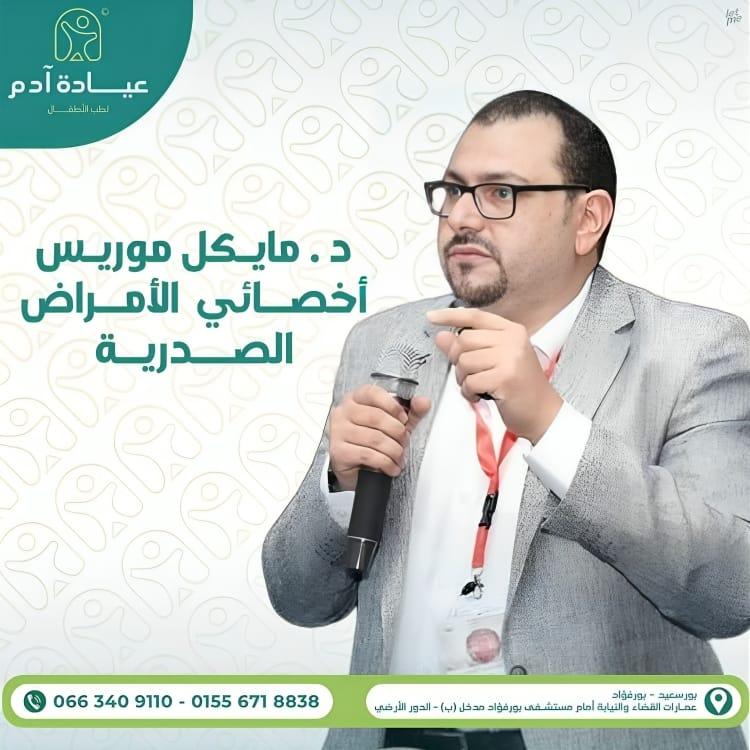Dr. Michael Morris
Specialist in Pulmonary Diseases and Allergies

- Name: Dr. Michael Morris
- Phone: 01012910053
- Area:
🩺 Dr. Michael Morris
Specialist in Pulmonary Diseases and Allergies (Adults and Children)
Master's in Pulmonary Diseases and Allergies - Ain Shams University
Member of the European Respiratory Society
🔬 Specialties and Services Offered:
💨 Pulmonary Diseases and Allergies:
Bronchial Asthma: Diagnosis and treatment of all types of asthma.
Bronchitis: Diagnosis and treatment of acute and chronic bronchitis.
Lung Diseases: Treatment of various lung diseases such as pneumonia and chronic conditions like chronic bronchitis.
💔 Respiratory Diseases Related to the Circulatory System:
Cardiopulmonary Diseases: Breathing issues resulting from heart and lung disorders, such as heart failure affecting lung function.
🦠 Immune Diseases:
Respiratory Allergies: Diagnosis and treatment of allergic rhinitis, sinusitis, and respiratory allergies such as allergic asthma.
Immune Respiratory Diseases: Including immune-related pneumonia.
🔬 Diagnostic and Therapeutic Bronchoscopy:
Bronchoscopic Examination: Early diagnosis using bronchoscopy to detect lung diseases like tumors or fibrosis.
Therapeutic Bronchoscopy: Performing direct treatment using bronchoscopy, such as removing tumors or foreign objects.
😴 Sleep Respiratory Function:
Sleep Apnea and Breathing Disorders: Diagnosis and treatment of sleep-related breathing disorders such as obstructive sleep apnea.
👶👵 Treatment for Adults and Children:
Dr. Michael Morris specializes in diagnosing and treating respiratory diseases for both children and adults, including congenital and acquired respiratory conditions:
Children: Treatment of congenital respiratory diseases like cystic fibrosis, asthma, and bronchial infections.
Adults: Treatment of diseases like tuberculosis, asthma, chronic cough, and other lung disorders.
📅 Clinic Hours:
🕔 Daily: From 5:00 PM to 9:00 PM
🕑 Thursday: From 2:00 PM to 6:00 PM
📅 Friday and Sunday: Weekly Off
📞 Appointment Booking:
Appointments are based on first-come, first-served availability at the clinic.
For inquiries or to book an appointment, please call: 01012910053
📍 Clinic Address:
Abbas and Alexandria Street, Al-Rahma Tower, Second Floor
Next to Ahmed Salama Library, Al-Arab District, Port Said Governorate.
⚕️ Note:
Dr. Michael Morris uses the latest medical techniques for diagnosing and treating respiratory diseases. The clinic is equipped with advanced facilities to ensure the best healthcare for patients.
FAQ
Pneumonia is an infection in the lungs, and it shows through the following symptoms:
1. Cough: It could have mucus or it might be dry.
2. High fever: Fever with chills (feeling cold with heat).
3. Difficulty breathing: Feeling like you can't take a deep breath.
4. Chest pain: The pain gets worse when you breathe deeply or cough.
5. Fatigue and exhaustion: Feeling extremely tired, unable to get up.
6. Loss of appetite: Not feeling like eating as usual, and sometimes feeling nauseous.
7. Excessive sweating: Especially at night.
8. Muscle aches: Feeling body aches like you have the flu.
9. Mental confusion: Older adults may feel confused or have trouble thinking clearly.
Note: These symptoms can be severe or mild depending on age and health condition.
The recovery time from pneumonia depends on the severity of the condition and the patient's age:
1. Mild cases: Recovery usually takes 1 to 3 weeks.
2. Severe cases or elderly patients: Recovery may take 6 to 8 weeks or longer.
Tips for faster recovery:
1. Get plenty of rest.
2. Stay hydrated by drinking lots of fluids.
3. Follow your doctor’s instructions and take all prescribed medications.
If complications arise or symptoms persist for an extended period, consult your doctor immediately to prevent further health issues.
Pneumonia is an infection that affects the lung tissue itself. This means the air sacs in the lungs become inflamed and may fill with fluid or pus. Its symptoms are clear and include:
1. High fever with chills.
2. Severe coughing, often accompanied by mucus or phlegm.
3. Difficulty breathing, and sometimes chest pain during deep breaths or coughing.
Bronchitis, on the other hand, is an inflammation of the tubes that carry air to the lungs (bronchial tubes). It’s often caused by viral infections or continuous smoking. The main symptoms are:
1. Persistent cough (which may be dry or produce mucus).
2. A feeling of tightness or mild pain in the chest.
3. Wheezing sounds when breathing.
4. General fatigue and exhaustion.
In summary, pneumonia directly impacts the lungs and tends to be more severe, while bronchitis affects the airways leading to the lungs and doesn’t involve the lung tissue itself.
Yes, pneumonia can be contagious, especially if it's caused by bacterial or viral infections. The infection can spread from one person to another through:
1. Coughing and sneezing: From an infected person.
2. Direct contact: Such as shaking hands with someone who is sick.
3. Contaminated air: Inhaling air that contains germs.
To reduce the risk of infection, it’s important to wash your hands frequently, avoid direct contact with sick individuals, and wear a mask if you’re in crowded areas or around infected people.
Symptoms of bronchitis may include:
1. Persistent cough: It can be dry or accompanied by mucus.
2. Difficulty breathing: You might hear wheezing (a whistling sound when breathing).
3. Chest discomfort: A feeling of tightness or heaviness in the chest.
4. Fever: A slight increase in body temperature.
5. General fatigue: Feeling tired and drained most of the time.
6. Nasal congestion or sore throat: A stuffy nose or throat pain might occur.
Note: Bronchitis is often caused by a viral or bacterial infection. The cough may persist even after other symptoms improve.
Bronchitis (acute bronchial inflammation) is usually not dangerous if treated properly. However, in some cases, complications can occur, such as:
1. Chronic bronchitis: If it lasts for a long time or if flare-ups are frequent.
2. Underlying health conditions: Conditions like asthma or heart diseases may increase the risk of complications.
3. Age and weakened immune system: The body may be less able to fight off infections.
4. Rare complications: Such as progression to pneumonia or breathing difficulties.
It is important to consult a doctor when symptoms appear to ensure appropriate treatment and prevent complications.
